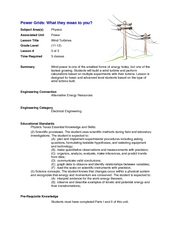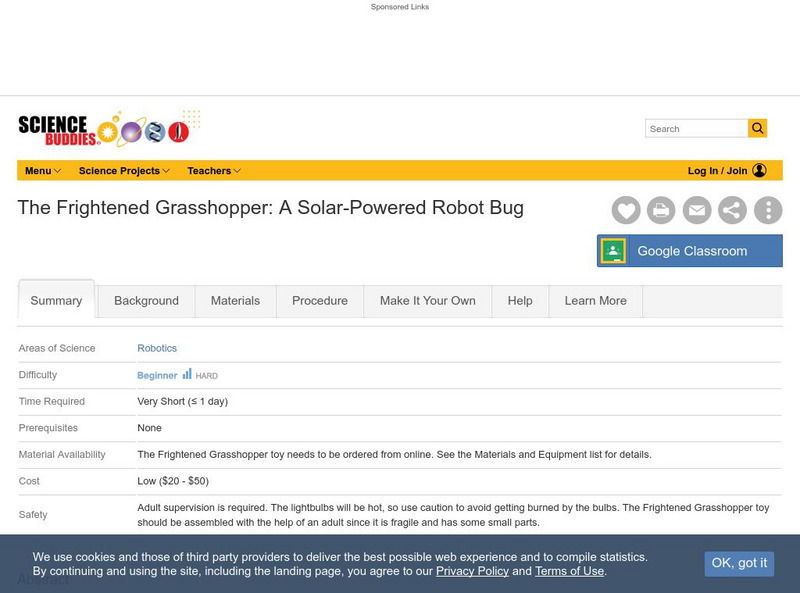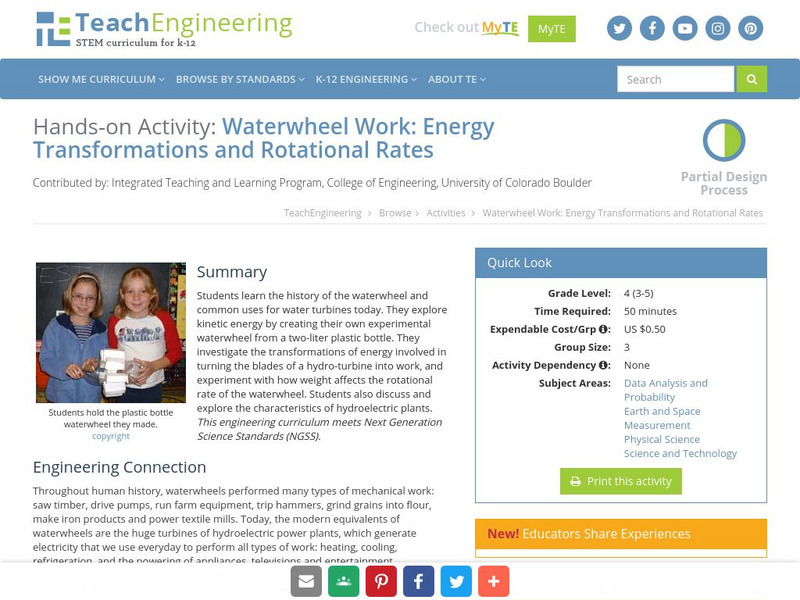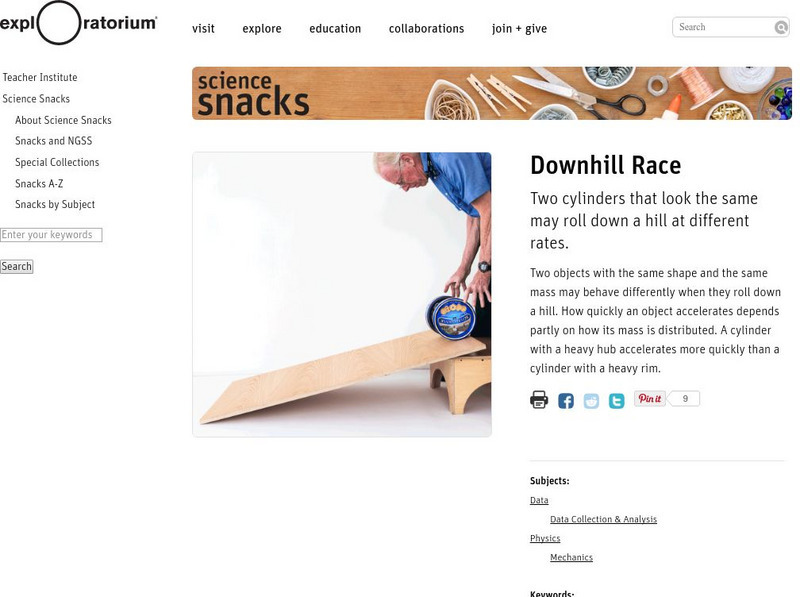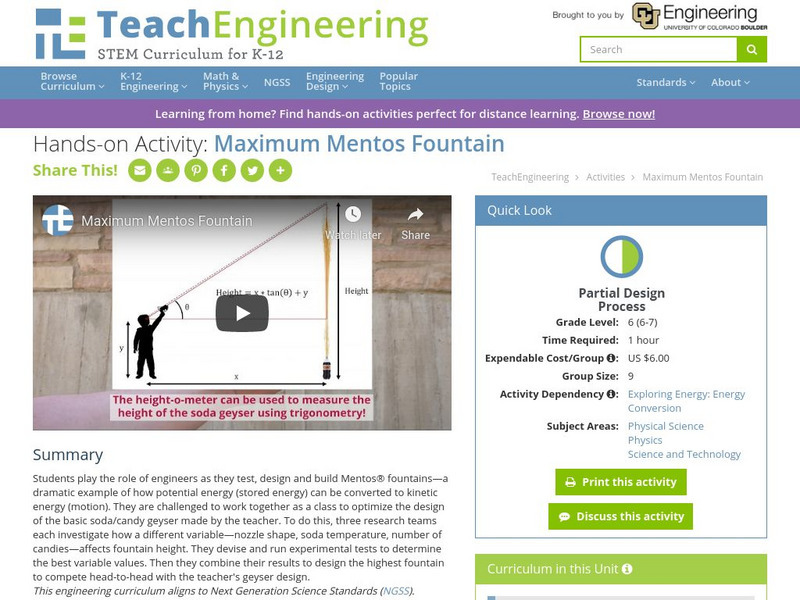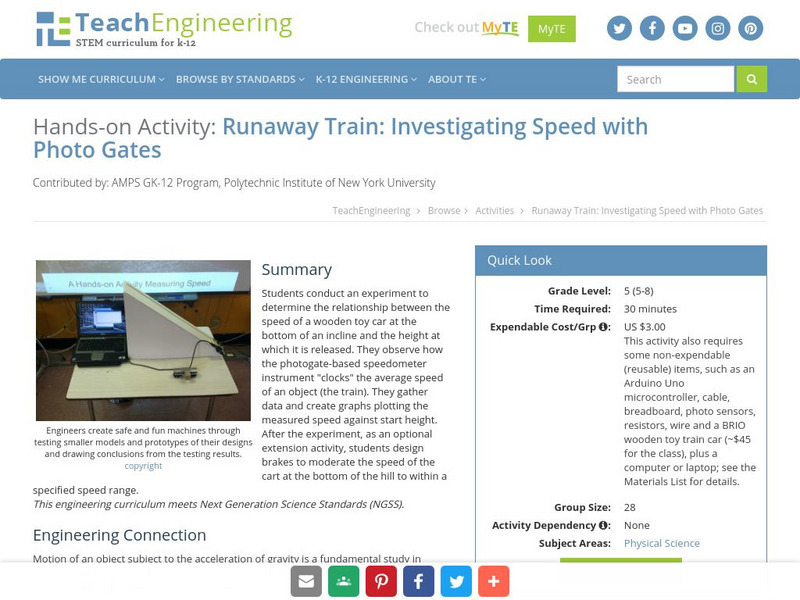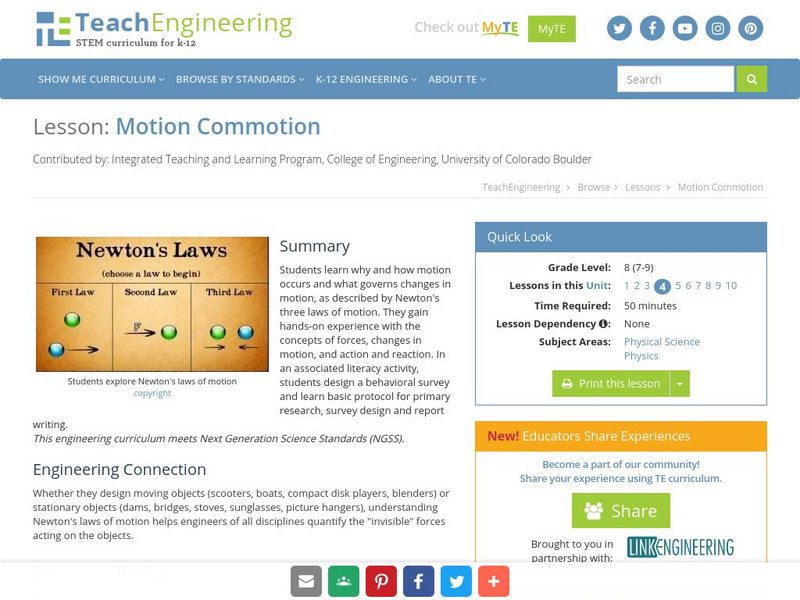Curated OER
Wind Turbines
Students build their own wind turbine. In this physics lesson, students calculate the power output of their wind turbines. They evaluate their design and make the necessary modifications.
Curated OER
Where My Peeps At?
Students conduct a series of activity that demonstrates Charles' and Boyle's Law. In this chemistry instructional activity, students determine the relationship among pressure, volume and temperature. They solve problems using...
Curated OER
Scientific Images & Animations
Students view a variety of scientific images and animations. They explore the world of science and visual art. Students enrich their knowledge through animation examinations of thoughts and feelings and awesome color rainbows of...
PBS
Pbs Teachers: Spool Racer Experiment
Demonstrate stored and kinetic energy by making a racer toy from a spool and a rubber band.
Science Buddies
Science Buddies: Project Ideas: Electronics and Solar Energy With a Robot Bug
In this science fair project, use the "frightened grasshopper" solar-powered toy to explore how solar energy is converted into kinetic energy. The Science Buddies project ideas are set up consistently beginning with an abstract,...
TeachEngineering
Teach Engineering: Falling Water
Students drop water from different heights to demonstrate the conversion of water's potential energy to kinetic energy. They see how varying the height from which water is dropped affects the splash size. They follow good experiment...
TeachEngineering
Teach Engineering: Waterwheel Work
Students learn the history of the waterwheel and common uses for water turbines today. They explore kinetic energy by creating their own experimental waterwheel from a two-liter plastic bottle. They investigate the transformations of...
Concord Consortium
Concord Consortium: Molecular Workbench: Experiment on Material Strength
Adjust the strength of interatomic interactions in this virtual bullet experiment. Observe how the adjustments in strength affect the material in the experiment.
Other
Lancaster University: Particle Physics Package
A collection of experiments, projects, and articles that will help students understand particle collision and mass, kinetic energy, magnetic field, the Large Hadron Collider, and detection of the Higgs particle.
Exploratorium
Exploratorium: Science Snacks: Downhill Race
An activity that explores how two cylinders that are identical in shape and mass may travel down a hill differently due to how their mass is distributed. Learn how the distribution of mass in an object can affect its translational...
Science Education Resource Center at Carleton College
Serc: Using Your Marbles: Making Energy Work for You
This activity is based on the common experiment of running a marble down a ramp to do work on a cup. Learners will be able to see the relationship between mass and energy of the marble and the ramp height.
Museum of Science
Museum of Science and Industry: Online Science: Activities: Make a Comeback Can
Step-by-step instructions, with photos, of how to make a metal can come back when it is sent rolling away. The can uses both kinetic and potential energy to roll away and back.
Center of Science and Industry
Cosi Columbus: Rubberband Rollback
A simple experiment that explores potential and kinetic energy involving the use of a can, a rubber band, some washers, and other everyday materials. Discover why the can rolls forward, then back.
TeachEngineering
Teach Engineering: Maximum Mentos Fountain
Students play the role of engineers as they test, design and build Mentos fountains - a dramatic example of how potential energy can be converted to kinetic energy. They are challenged to work together as a class to optimize the design...
Center of Science and Industry
Cosi Columbus: Catapult
Science experiment that demonstrates how energy is transferred. Includes full list of materials, procedures, and scientific explanation of how the tension in the catapult causes an object to travel far.
Museum of Science
Museum of Science and Industry, Chicago: Activities: Build a Roller Coaster
Build the roller coaster, then keep making adjustments to see how it affects the potential and kinetic energy of the marble along its tracks.
TeachEngineering
Teach Engineering: Runaway Train: Investigating Speed With Photo Gates
Students conduct an experiment to determine the relationship between the speed of a wooden toy car at the bottom of an incline and the height at which it is released. They observe how the photogate-based speedometer instrument "clocks"...
John F. Kennedy Center
The Kennedy Center: Balancing Mobiles
In this lesson plan, students will apply mathematical, science, and engineering concepts to experiment with balancing levers. They will learn to classify types of levers to design and build a simplified mobile. Students will explore...
Science Museum of Minnesota
Science Museum of Minnesota: Thinking Fountain: Friction
The Thinking Fountain provides this simple experiment for understanding friction and it relationship to energy.
PBS
Pbs Learning Media: Mystery Mud: Exploring Changes in States of Matter
Join a group of middle-school students on a visit to a laboratory at the Massachusetts Institute of Technology, where they experiment with "mystery mud" and learn about the relationships between magnetism, particle motion, and changes in...
Museum of Science
The Atoms Family
Let this classic family of monsters guide you as you learn about energy. Interactive exercises, experiments, and demonstrations help to build knowledge and raise questions.
University of Colorado
University of Colorado: Ph Et Interactive Simulations: Reaction & Rate Simulation
Students will learn what causes reactions and what affects the rates of reaction through data collected by conducting several simulated experiments.
TeachEngineering
Teach Engineering: Motion Commotion
Young scholars learn why and how motion occurs and what governs changes in motion, as described by Newton's three laws of motion. They gain hands-on experience with the concepts of forces, changes in motion, and action and reaction. In...
TeachEngineering
Teach Engineering: Dams
Through eight lessons, students are introduced to many facets of dams, including their basic components, the common types (all designed to resist strong forces), their primary benefits (electricity generation, water supply, flood...


